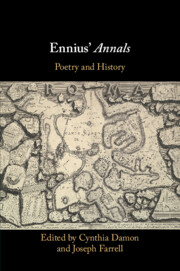Book contents
- Ennius’ Annals
- Ennius’ Annals
- Copyright page
- Dedication
- Contents
- Contributors
- Abbreviations
- Introduction: History and Poetry in Ennius’ Annals
- I Innovation
- II Authority
- III Influence
- IV Interpretation
- Chapter 12 Ennius and Lucilius: Good Companion/Bad Companion
- Chapter 13 Ennius’ Annals as Historical Evidence in Ancient and Modern Commentaries
- Chapter 14 Commenting on the Annals: Steuart, Skutsch, and Ennius
- Afterword
- Works Cited
- General Index
- Index Locorum
Chapter 13 - Ennius’ Annals as Historical Evidence in Ancient and Modern Commentaries
from IV - Interpretation
Published online by Cambridge University Press: 10 April 2020
- Ennius’ Annals
- Ennius’ Annals
- Copyright page
- Dedication
- Contents
- Contributors
- Abbreviations
- Introduction: History and Poetry in Ennius’ Annals
- I Innovation
- II Authority
- III Influence
- IV Interpretation
- Chapter 12 Ennius and Lucilius: Good Companion/Bad Companion
- Chapter 13 Ennius’ Annals as Historical Evidence in Ancient and Modern Commentaries
- Chapter 14 Commenting on the Annals: Steuart, Skutsch, and Ennius
- Afterword
- Works Cited
- General Index
- Index Locorum
Summary
This chapter examines the commentary tradition of a one-line fragment of Ennius’ Annals, qui vicit non est victor nisi victum fatetur (513 Skutsch). Although modern commentators have adduced a broad range of comparanda, their selection of historical parallels reflects preconceived notions of what the line must mean. By returning to the line’s original context in a late-antique scholium on the Aeneid, we are better able to appreciate the line as an epic fragment. Parallels drawn from Ennius and other poets allow for a different reading of the fragment, and suggest alternative methodologies for the use of fragments in historical arguments.
- Type
- Chapter
- Information
- Ennius' AnnalsPoetry and History, pp. 262 - 279Publisher: Cambridge University PressPrint publication year: 2020

